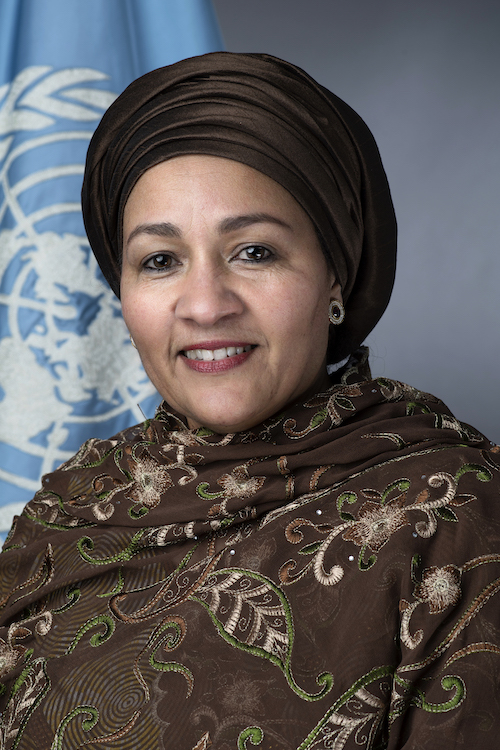The UN Deputy-Secretary General, Amina J. Mohammed, stressed the critical need for global collaboration to achieve the Sustainable Development Goals, especially amid growing poverty and ongoing conflict.
With Qatar preparing to host the Second World Summit for Social Development in 2025, Amina J. Mohammed, Deputy Secretary-General (DSG) of the United Nations, has urged the international community to make concerted efforts towards the UN’s Sustainable Development Goals (SDGs).
In 2015, all UN member states adopted the 2030 Agenda for Sustainable Development, anchored by 17 goals. This includes eradicating poverty and hunger, advancing climate action as well as promoting peace, justice and strong institutions.
“The SDGs are not about charity,” the UN official said. “It’s about what we invest in people’s economies so that they can grow them, inclusively to pay for basic services that are rights.”
Mohammed’s remarks, part of Qatar Foundation’s ‘Towards the Second World Summit for Social Development 2025: The Road to Doha and Reinforcing Global Efforts to Achieve the 2030 Agenda’ session on Wednesday, further situated the SDGs within the context of today’s international crises.
“Today, we are shaken by what we see in many places as double standards in the international community,” she added in her opening remarks.
International crises
The DSG’s address comes amid escalating tensions and ongoing conflicts worldwide. A phenomenon which has induced various crises among civilian populations.
“The number of people living in extreme poverty is almost 700 million and growing. The number of people facing hunger is over 730 million and growing,” Mohammed said.
In Gaza, where Israel’s assault on the enclave shows no sign of letting up, the Integrated Food Security Phase Classification (IPC) projects that between November and April 2025, over 90 percent of the enclave’s population will be classified as experiencing ‘crisis’ food insecurity.
In response, the food security watchdog calls for an immediate and sustained ceasefire to restore local food production and prevent malnutrition.
The need for a ceasefire was also a focal point during a telephone call on Tuesday between the Qatari Prime Minister and Minister of Foreign Affairs, Sheikh Mohammed bin Abdulrahman Al Thani, and his Egyptian counterpart, Badr Abdelatty. For the past year, Cairo and Doha have both been involved in mediating between Israel and Hamas on reaching an end to the war on the Gaza Strip.
Further, Mohammed also stressed the need to improve access to quality and relevant education, employment, universal health care and social protection – rights that remain severely limited for many.
In Gaza alone, as Israeli air strikes destroyed at least 493 – or 87 percent – of school buildings and a further 35 universities, the UN’s humanitarian office reports that as many as 625,000 Palestinian students in the Strip have been left without access to formal education.
‘The burden of conflict is on women’
The UN DSGl also discussed the disproportionate toll of conflict on women, describing crises as “stalling or reversing” initial progress toward the SDG’s fifth goal of achieving gender equality and empowering women and girls.
In a recently published report by the UN’s Independent International Fact-Finding Mission for the Sudan, it was found that war crimes and crimes against humanity committed by the Rapid Support Forces (RSF) include widespread sexual and gender-based violence against women and girls.
“The ongoing conflict between the SAF and the RSF has seen a resurgence of sexual violence. Especially rape and gang-rape are widespread and continue to occur on a large scale,” the report said. Such occurrences were also cited as prevalent during invasions of cities and against individuals fleeing conflict areas.
“Those two generals should not be doing what they’re doing to their country today,” Mohammed said, referring to the violent power struggle led by the Sudanese Armed Forces’ General Abdel Fattah Al Burhan and the RSF’s Mohamed ‘Hemedti’ Hamdan Dagalo.
Grassroots journalists have also reported that Sudanese women have resorted to committing suicide to escape the perils of such atrocities.
“The burden of conflict is on women [and] children,” Mohammed said, emphasising the systematic injustices of manmade humanitarian catastrophes. “If women were in leadership, we wouldn’t be in [this] mess.”
The DSG also stressed the importance of women’s presence at humanitarian discussion tables, stating that pathways towards lasting peace can only be achieved through their involvement.







